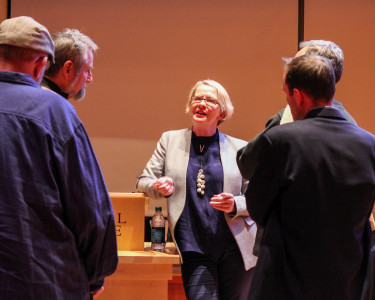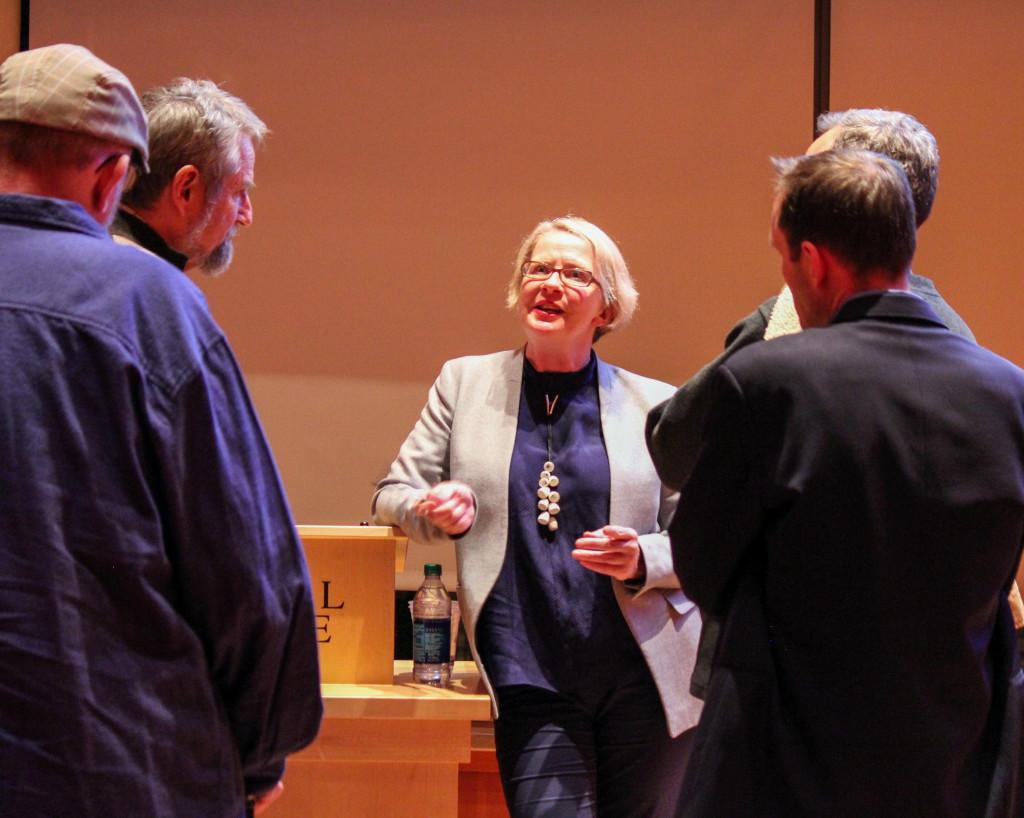The technology of war has developed to include many different types of weapons, which historian Joanna Bourke, professor of history at Birkbeck College, University of London, enumerated in her talk, “Designed to Kill: The Science and Art of Killing, 1914-1945.”
Bourke spoke on Tuesday, April 21 in JRC 101 as the final speaker in the Center for the Humanities’ series on “A Century of War: 1914 and Beyond,” which looked at the changes and transformations that came about as the result of the First World War.
Over the course of her talk, Bourke laid out a framework for understanding the radical transformations that occurred in the ballistics industry during World War I.
“Citizens are the main victims … citizens are the target of choice for killing,” Bourke said, explaining why she believes that an understanding of ballistics and weaponry is so important to the general public. She followed by leading the audience through a history of ballistics in the early twentieth century, beginning with the late Colonial period and ending in the later years of WWI. Bourke also expressed her puzzlement as to why the ballistics side of the war is not focused on more heavily.
“With the anniversary of the First World War, there’s so much talk about shell shock and all that sort of stuff, and yet no one sort of wonders where those shells come from,” she said.

Photo by Misha Gelnarova.
Bourke’s work focuses on the scientific journals and textbooks from that time period, which explain the manufacturing and testing of new and improved weaponry. By looking at the language used in these textbooks and the actual methods of ballistics production, Bourke said that she has been able to single out interesting points in the mindset of those who were creating new types of destructive weaponry.
“It’s taken for a given that these sort of things exist,” Bourke said.
Though her talk was focused on WWI, Bourke’s research took her from the American Civil War all the way up to the present, as she sought to expand the scope of her work beyond one time period. For example, she looked at the progression of lethality of weapons, including what she describes as the game of deciding which kinds of violence are objectively better. She traced how her interest in this area began with her research into the British working class in the nineteenth and early twentieth centuries.
“We need to understand the whole history of it in order to actually get the depth of understanding,” Bourke said.
While conducting research, Bourke found that the working class only ever sent letters or kept diaries during wartime, which she thought was fascinating.
“Once I started reading these letters and diaries, you can’t help but be seduced by them,” Bourke said. “Being a historian is so fantastic because it’s total voyeurism. You get to read the love letters of men, you get to read the most intimate accounts.”
Subsequently, Bourke described her own interest in regard to the concepts of good and evil within war, and what that meant for historians examining this period.
“I became very interested in this tension of good men doing bad things, ordinary men doing bad things,” Bourke said. “We need to take seriously [the idea] that British and American soldiers in war do get exhilarated with war, and a lot of military historians don’t find that comfortable to write about.”
She also advocated for an acceptance of the reality of wars in general and the emotional changes it brings, instead of the repression that is often seen.
“The repression of war experience is something we all face. We don’t want to admit that our taxes are paying to kill our lovers, are paying to kill strangers that we might have loved,” Bourke said. “We all kind of put our heads in the sand, and that’s what’s really dangerous.”
-Eva Lilienfeld ’17 contributed reporting.





























































